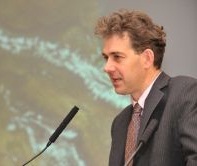TBILISI, DFWatch – We asked Caucasus expert Tom de Waal a few questions following Monday’s meeting between U.S. president Barack Obama and Georgian president Mikheil Saakashvili in Washington. de Waal is a journalist and writer, previously Caucasus editor of Institute for War and Peace Reporting, and now senior associate at the Carnegie Endowment for International Peace, focusing on the South Caucasus.
– Some words about your impressions after the Oval Office meeting.
– I think the meeting went well in the sense that both sides got something that they wanted out of it. I thought the body language between the two was not as natural as it was between Saakashvili and George W. Bush.
For President Saakashvili it was obviously important to get a meeting in the Oval Office in the first place. He also received warm words from Obama about Georgian reforms, a continuing commitment to Georgian NATO membership and US defense cooperation and the promise of a free trade agreement—which will obviously be much more important for Georgia than it will be for the United States.
President Obama wanted to publicly thank a loyal contributor to the NATO mission to Afghanistan, when other countries, such as France, are declaring that they will pull out early and put a bigger burden on Washington. But primarily he wants to see greater stability in the region and more trade opportunities, primarily with Russia. So it was important to express gratitude for Georgia’s cooperative attitude on the World Trade Organization deal with Russia.
For the United States to take advantage of Russia’s WTO accession and for US businesses to trade with Russia under the new rules, Congress must repeal the Jackson-Vanik amendment on trade with Russia. But there is a strong anti-Russia Republican contingent in Congress which will oppose repealing the amendment. Proposing a free trade agreement with Georgia is a good tactic to persuade these people in Congress to drop their objections.
So there was also a domestic political agenda in the meeting for Obama too. Whoever is the Republican presidential candidate will inevitably try to accuse him of being “soft” on Russia because of his re-set policy, especially after Vladimir Putin is re-elected president in Russia in March. And, prior to this meeting, there might have been accusations about “betraying” Georgia. That is no longer possible and this meeting was a kind of pre-emptive strike on that issue. It was good for Obama that the Georgian president left the meeting saying, “I am leaving this office very happy.”
– President Obama mentioned “formal transition of power”. This phrase has stirred a debate here about what exactly he meant. What do you think, what did Obama mean by this phrase? Did he mean that Saakashvili should leave politics?
– Of course there was an element of ambiguity here and we don’t know what was said in the private meeting. But I think the phrase “formal transfer of power” [NB TRANSFER NOT TRANSITION] did contain a warning to President Saakashvili that he should not try to cling on to power by other means, such as becoming prime minister. I think this issue will be clarified when we see the behavior of both sides over the next few months and when Secretary of State Hillary Clinton visits Georgia.
– If Saakashvili pursues the path of Putin and comes as a prime minister (while the new constitution gives the prime minister greater power) what will it cause in the attitude of the US and generally the West?
– If he takes this step, Saakashvili will survive in that the move will be legal. But I think it will tarnish his reputation in the West and he won’t be received at the same level. Saakashvili did well to rehabilitate himself after the disaster of 2008 but I doubt he could do so a second time. And I think he is beginning to hear that message from different Western interlocutors.
– During the briefing after the meeting the presidents mentioned the deepening of military cooperation. What perspectives do you foresee in this regard? Namely, the prospective of deepening ties between US and Georgia in the security realm?
– I cannot say. The Afghanistan mission will end in 2014 and NATO membership is a very long-term prospect, as President Obama also made clear after the meeting. Besides, neither of the two presidents mentioned the subject which everyone wants to ask, that of weapons sales to Georgia.
– What was discussed between the presidents behind the closed doors?
– I wish I knew!
– What is expected in Washington for the Georgian Parliamentary elections later this year? Will the elections be scrutinized by the US?
– The elections will be scrutinized by the US and European bodies and institutions. The Georgian governing elite has set itself high standards and foreign observers will ask them to stick by them.
– How did your expectations regarding the meeting have been met? What did you expected and what really happened?
– I think i answered this in question 1.
– Saakashvili is to hold a speech later about the reforms he has overseen here in Georgia, in comparison to the Arab uprisings. His government has made its experiences available to Egypt. In your opinion, how good a democracy teacher is Saakashvili for the Arab countries?
– The parallels are very inexact. Mubarak had been in power for thirty years. Shevardnadze was Saakashvili’s former patron and agreed to step down and hand over power to his protégés, Zhvania and Saakashvili. I see this as part of the Georgian governing elite’s continuing efforts to “brand” Georgia abroad as the country of a peaceful revolution and successful reforms. They are brilliant at PR and in many ways more popular abroad than they are at home.






Leave A Comment
You must be logged in to post a comment.